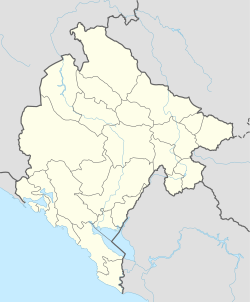Vusanje (Montenegrin Cyrillic: Вусање; Albanian: Vuthaj) is a village in Gusinje Municipality, Montenegro. According to the 2003 census, the town had 648 inhabitants.
Vuthaj
Вусање Vuthaj | |
|---|---|
Town | |
| Coordinates: 42°31′46″N 19°50′25″E / 42.52944°N 19.84028°E | |
| Country | Montenegro |
| Region | Northern |
| Municipality | Gusinje |
| Population (2003) | |
• Total | 648 |
| Time zone | UTC+1 (CET) |
| • Summer (DST) | UTC+2 (CEST) |
| Area code | +382 51 |
| Vehicle registration | GS |
| Climate | Cfb |
Geography
editVusanje is located within the Plav municipality, below the town of Gusinje. It is located in the geographical region of Prokletije mountain, in the basin of the Lim river.[1] There is a notable waterfall Grlja.
History
editThe village was settled by ancestors of the Kelmendi region of Albania, by Gjonbalaj and Nrel Bala family. Until 1912, it was part of Ottoman Empire. During the First Balkan War in 1912 it became part of the Kingdom of Montenegro. The village is made up of two settlements, Katundi i siper (upper village) and katundi i ulet (lower village). Also there is a hamlet called Zarunic. Post 1913, the village was subjected to repression and discrimination from the Montenegrin and Yugoslavian governments. The result was the expulsion of the 90% of the population to the United States, mostly in the New York area. The remaining population is now 100% Albanian.
There is an old cemetery in the village, called "the Catholic cemetery".[2]
Culture
editThe population of the village identifies as Muslim. Currently, there are two Mosques in the village (1990).[3]
Anthropology
editThe village is Albanian-inhabited, one of three Kelmendi settlements along with Martinovići and Novšići, in the Upper Polimlje region (1958).[1] The majority of families hail from the nearby village Vukël in Kelmend across the border in Albania. The Albanians are native inhabitants in this region although today the vast majority of the village has been Slavicised and the population identify as Slavic Muslims.
Families
edit- Uljić (Albanian: Ulaj)
- Đonbalić (Albanian: Gjonbalaj)
- Ahmetović (Albanian: Ahmetaj)
- Vučetović (Albanian: Vuçetaj)
- Čelić (Albanian: Çelaj)
- Brunčević, Bručević (Albanian: Brunçaj, Bruçaj)
- Kukić (Albanian: Kukaj)
- Dedušević (Albanian: Dedushaj)
- Ćosić (Albanian: Qosaj)
- Selimović (Albanian: Selimaj)
During SFR Yugoslavia, families had Serbian(ized) surnames.[4]
Demographics
editThere is a high demographic vitality in Vusanje in relation to the other villages in the municipality.[5] The village is inhabited exclusively by Albanians,[6] Muslims by religion (2011 census).[7] The Albanians of this village speak with the Gheg dialect of the Albanian language.
| Year | Pop. | ±% |
|---|---|---|
| 1948 | 781 | — |
| 1953 | 859 | +10.0% |
| 1961 | 935 | +8.8% |
| 1971 | 1,103 | +18.0% |
| 1981 | 1,399 | +26.8% |
| 1991 | 1,103 | −21.2% |
| 2003 | 866 | −21.5% |
| 2011 | 648 | −25.2% |
| Source: [citation needed] | ||
Notable people
edit- Sadri Ahmeti, painter
- Mimoza Ahmeti, poet
- Isa Qosja, Albanian film director
- Rexhep Qosja (born 1936), Albanian writer and literary critic
- Ahmet Zenel Gjonbalaj, rebel
- Sadri Gjonbalaj, retired Albanian-American soccer player
- Qerim Sadiku (1919-1946) Catholic saint
References
edit- ^ a b Barjaktarović 1958, p. 217.
- ^ Barjaktarović 1958, p. 219.
- ^ Madžida Bećirbegović (1990), Džamije sa drvenom munarom u Bosni i Hercegovini, Veselin Masleša, p. 192, ISBN 978-86-21-00452-2,
U okolini Gusinja, u selu Vusanje postoje dvije džamije sa drvenom munarom
- ^ Vojska. Vol. 8. Vojnoizdavački i novinski centar. 1999. p. 48.
- ^ Marko Knežević. "Проблеми привредног развоја општине Плав као узрок депопулације насеља". Velika.
- ^ "Census 2011 data - Settlements: Table N1. Population by ethnicity by settlement" (XLS). Statistical Office of Montenegro.
- ^ "Census 2011 data - Settlements: Table N3. Population by religion by settlements" (XLS). Statistical Office of Montenegro.
Sources
edit- Barjaktarović, Mirko (1958). "O grobljima i grobovima u gornjem polimlju". Bulletin du Musée ethnographique de Beograd. Muzej: 217–219.
